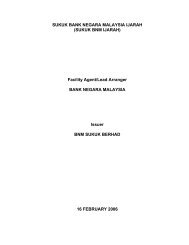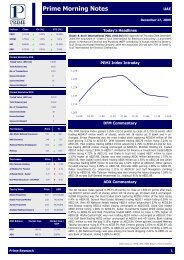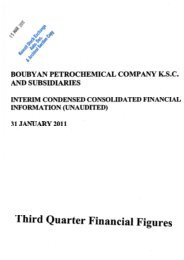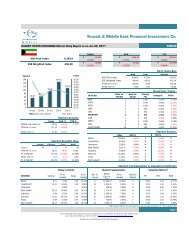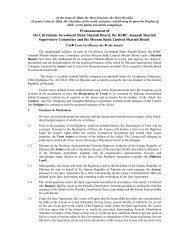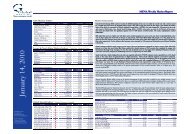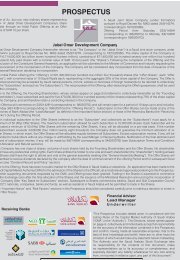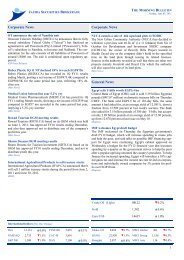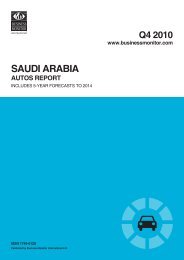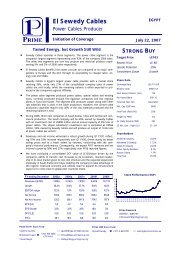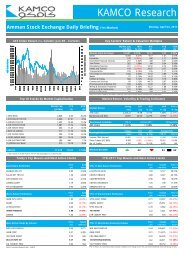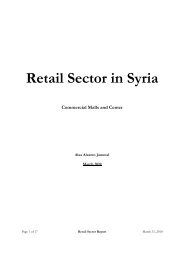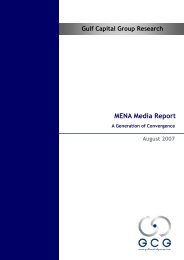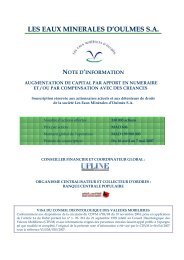Create successful ePaper yourself
Turn your PDF publications into a flip-book with our unique Google optimized e-Paper software.
6 Libya<br />
Fiscal policy<br />
Monetary policy<br />
grow. The partial privatisation of two telecommunications companies and an<br />
iron and steel firm has been proposed. An initial public offering for shares in<br />
the latter was reported in August to be going ahead. The government is also<br />
committed to streamlining the bureaucracy, but little action has been taken. Ten<br />
new laws have been introduced in 2010 to improve the business and<br />
investment environment, but are still awaiting executive regulations to clarify<br />
how they will be implemented.<br />
The whims of Colonel Qadhafi will continue to create uncertainty in<br />
policymaking. This will deter investors, who are unlikely to be assuaged by a<br />
proposed new hydrocarbons law. During 2009-10 the government suspended<br />
visas for EU citizens living within the Schengen visa area and hinted that it<br />
might nationalise the hydrocarbons sector. Despite the award of dozens of<br />
exploration permits, drilling success has been limited, and when exploration<br />
has been successful development of the discoveries has been impeded. This has<br />
dented the positive perceptions of investing in Libya's hydrocarbons sector and<br />
its entire economy more generally. Foreign investment, which is vital for<br />
development, is therefore likely to become harder and more expensive for Libya<br />
to obtain, and more major foreign oil companies may leave—particularly as a<br />
number of exploration permits lapse this year. BP has confirmed its intention to<br />
proceed with its own major exploration programme, although its deepwater<br />
exploration programme has been delayed, possibly as a consequence of safety<br />
concerns related to the oil spill in the Gulf of Mexico.<br />
The government has had a healthy budget surplus in recent years owing to high<br />
oil revenue and a tendency to fall short of spending commitments. The fiscal<br />
surplus shrunk in 2009 to 4.6% of GDP owing to lower average oil prices and<br />
revenue. The government expects to increase expenditure by 32% in 2010.<br />
Although current expenditure will increase, as efforts to cut the size of the civil<br />
service have been postponed, a public-sector pay rise is planned and subsidies<br />
will be kept in place to control consumer prices, capital expenditure is likely to<br />
fall short of targets. Combined with higher oil prices this will lead to an increase<br />
in the budget surplus in 2010 to 5.9% of GDP. In 2011 cutbacks in capital<br />
expenditure to meet existing government plans and spending restraint owing to<br />
lower international oil prices will lead to a further increase in the budget<br />
surplus to 10.2% of GDP. Lower than expected government expenditure in 2009<br />
has led us to revise up our estimates and forecasts for the fiscal balance.<br />
The currency is pegged to the IMF's special drawing rights (SDR), which<br />
restricts monetary policy flexibility. Nonetheless, the Central Bank of Libya<br />
cut benchmark interest rates by 2 percentage points in early 2009 and<br />
increased them back to 5% in early 2010. Pressure on the Central Bank to<br />
overhaul its approach to monetary policy and regulation of financial services is<br />
likely to increase as the banking sector is liberalised. Liquidity is excessive,<br />
and state-subsidised credit institutions are currently crowding out commercial<br />
bank lending. Efforts will be made to address these issues.<br />
<strong>Country</strong> <strong>Report</strong> August 2010 www.eiu.com © The Economist Intelligence Unit Limited 2010



